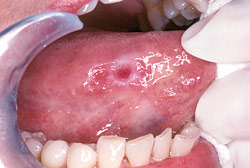Oral Cancer – Diagnosis & Treatment
Who Is at Risk?
The risk factors are surprising for many. In the past, most people thought oral cancer was only found in aging individuals and it does still occur most often in people over 40. However, younger individuals are making up an increasingly larger percentage of oral cancer patients. This is primarily due to the increased occurrence of Human Papilloma Virus (HPV16), a sexually transmitted disease.
There are still other major risk factors that may apply. Individuals who are middle aged or older and are moderate to heavy drinkers or long-term tobacco users have the greatest risk of developing this cancer. Chronic sun exposure, which is typically associated with skin cancer, can also cause cancer on the lips. Genetics may also have a major impact on your risk factors.
Signs & Symptoms
 Most of the lumps, bumps, and occasional sores you find in and around your mouth are completely harmless. But you should look out for changes such as white or red patches, ulcers and lumps anywhere in and around your face and neck that persist for more than a couple of weeks. A persistent sore throat or hoarseness is also cause for concern. Most oral cancers are “squamous” (scale-shaped) cell carcinomas. The sides of the tongue are the most common sites for these small lesions. Because the tongue has a rich blood supply and a direct connection to the lymphatic system (a part of our immune system), it’s a site from which cancer can easily spread. The floor of the mouth under the tongue is the second most common site. Cancerous lesions on the lower lip, which are usually preceded by chronic sun exposure, are not uncommon.
Most of the lumps, bumps, and occasional sores you find in and around your mouth are completely harmless. But you should look out for changes such as white or red patches, ulcers and lumps anywhere in and around your face and neck that persist for more than a couple of weeks. A persistent sore throat or hoarseness is also cause for concern. Most oral cancers are “squamous” (scale-shaped) cell carcinomas. The sides of the tongue are the most common sites for these small lesions. Because the tongue has a rich blood supply and a direct connection to the lymphatic system (a part of our immune system), it’s a site from which cancer can easily spread. The floor of the mouth under the tongue is the second most common site. Cancerous lesions on the lower lip, which are usually preceded by chronic sun exposure, are not uncommon.
Oral Cancer Detection
As part of your routine dental checkup, a thorough screening is performed, making it essential to keep your regular examinations. During the screening, your dental professional will look at your tongue, lips and inside of your mouth to identify changes, such as red or white patches or any unusual sores. Touch may also be used to check for swelling or lumps and your tongue may be moved to the side. A biopsy will be performed on any unusual areas.
In addition, if you identify any color changes or abnormal sores in the oral area, it’s important to seek assistance. In many cases, these issues are benign, but it’s important to catch problems early. If these issues don’t resolve on their own within 2 to 3 weeks, see your dentist. The only way to diagnose oral cancer is through laboratory testing. The key is in getting an early diagnosis through regular screenings and dental checkups.
Diagnosis & Treatment
Regular screening for oral cancer is one of the most important services provided to you at the dental office. Your regular dental checkup includes a visual and tactile (touch) examination for any signs of oral cancer or precancerous lesions in and around your mouth and throat. Anything that looks suspicious, may be analyzed with a routine procedure called a biopsy, in which a small amount of the suspicious tissue is sent to a laboratory for microscopic inspection. This is the best way to get a definitive diagnosis. Should the lesion turn out to be cancerous, the rest of the malignant tissue will be removed. It’s possible that radiation and/or chemotherapy will be needed to eradicate the disease. As mentioned before, when treatment occurs early, the survival rates are excellent.
Prevention
There are lifestyle choices you can make to reduce your risk considerably. Giving up tobacco in all forms, along with alcohol are big ones. Avoiding risky sexual behavior is also important. Protect yourself from overexposure to the sun, and eat a healthy diet. Research has consistently found that a high intake of fruits and vegetables is protective against oral and throat cancer; a good diet will also bolster your immune system. And please remember to schedule regular checkups here at the dental office. An oral cancer screening takes just a few minutes, but it could save your life.